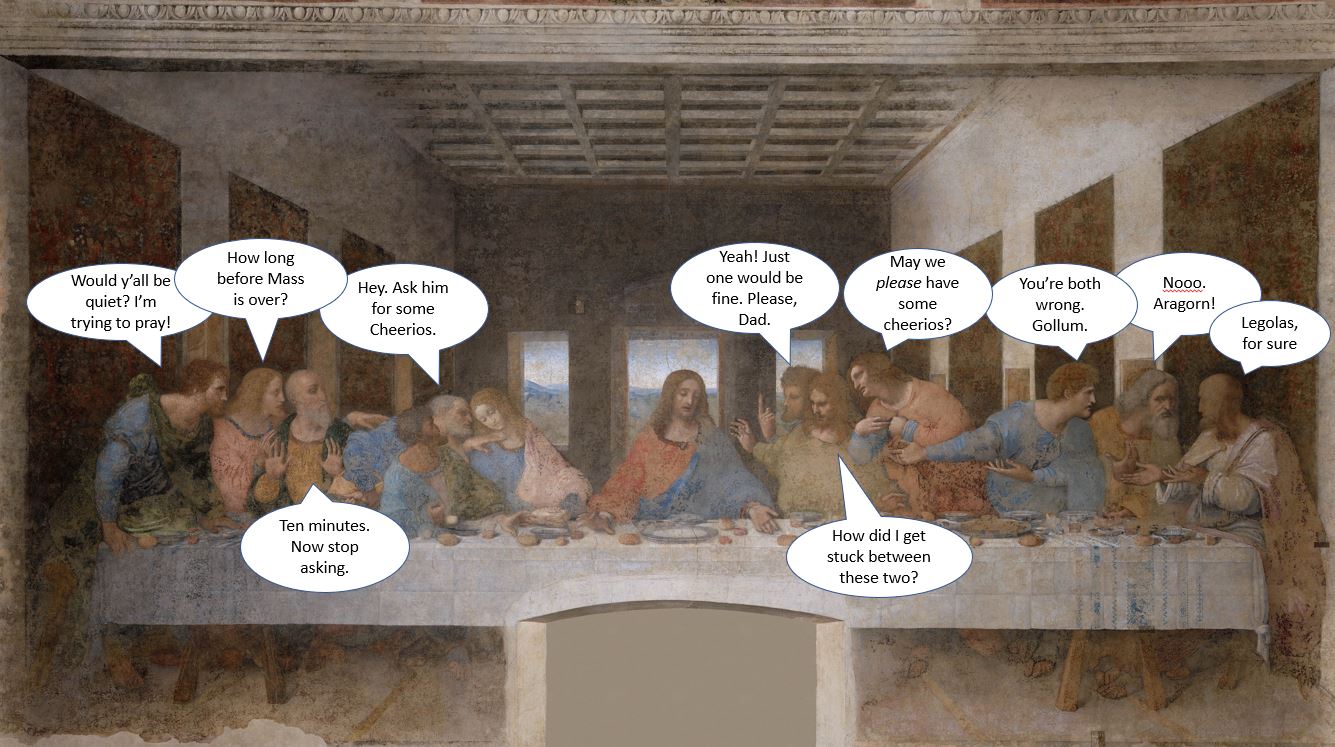While I don’t watch basketball, it’s March and the title fit well enough.
Over the last three posts, I’ve poured out a number of thoughts on our family’s struggle to reinvent our home life. Today I’ll wrap up the final four, but as a quick reminder, here they all are:
1. Mean what you say; say what you mean.
2. Have rewards, but use them sparingly and emphasize that work itself is a reward.
3. Divorce anger from the act of punishing. And in terms of punishing, make it immediate if at all possible. Do not let bad behavior slide. It will only get worse.
4. Minimize distraction. We don’t have a screen problem; we have an abundance of enjoyable distractions problem, and no clear place for these distractions to exist. Inevitably, they would work their way into the homeschooling area. Then no one gets any work done.
5. More time for play (I promise this doesn’t conflict with #4, and I’ll explain why)
6. Have a reliable schedule
7. Emphasize family unity (no one’s done until everyone’s done; your sins impact others; if one of us is going, we’re all going)
8. Don’t be afraid to take away big privileges and incur some inconvenience for yourself: your child’s eternal soul is worth it.
9. Checks and balances in homeschooling.
10. Speak a lot less.
11. Negative reinforcement is OK most of the time. Fear is a good catalyst when kids are young. They will learn how to do things out of love in time, but early on it’s about safety.
12. Make the house work for you, not you for the house.
We’ll be talking 9 – 12 today, and then I’ll conclude asking for your prayers because, well, we need them!
Watchful Homeschooling
My wife and I have run the gamut on homeschooling styles. Our first experience was with Mother of Divine Grace. We thought that the highly-prescriptive nature of the curriculum would make for a less fussy experience, but given our status as Rookie parents and having never been homeschooled ourselves, we had little in the way of understanding of how it should actually be done. Yes, they give you a nice syllabus and some recommended reading, but it was clear after a month in that it wasn’t going to work for us, and by us, I absolutely mean my wife. At this point in our marriage, teleworking wasn’t remotely an option, so the work was entirely on her.
We then shifted gears into a more freeform grab-and-go homeschooling approach. We stocked our shelves full of books and picked up dozens of workbooks. We’d randomly give out these pages to our children and hope that something stuck. While we had fledgling success with the Saxon Math workbooks, everything else was objectively unsuccessful. They weren’t motivated (and neither were we). It was around this time that a friend of ours recommended 100 Easy Lessons (which you can find anywhere). We picked up a copy and it was off-to-the-races with reading. This was and still is, by far, the most successful we’ve been. My wife has done a stellar job of getting our kids reading, and it has stuck.
Our oldest (Lily, 9) reads several books a week. Her little sister (Teresa, 7) plowed through the Little House Series in just a few days. Our sons (Hank, 4, and Joe, 2) spend a great deal of time staring at books, and Hank is closing in on Lesson 25 of his 100 Easy Lessons curriculum. The way we see it: reading is the gateway to academic success (and, we think, a rich interior life): if you can sit still and ponder, you will be much better off.
Still, we struggled getting the kids into math, writing, and various other subjects.
Then we learned about the Robinson Curriculum. I’ll be the first to admit it’s definitely not for everyone, and we did it wrong for almost a year. Billed as a minimalist approach to homeschooling, it sounded perfect. In theory it’s great! In practice, I think every parenting duo’s level of involvement will be dependent upon their family culture and the temperament of their children.
As I said, we were downright inefficient for the first year in that we handed the reigns of homeschooling entirely over to our children. We printed the curriculum books for our oldest and set her loose. We gave them the requisite math flash cards and expected them to follow the system. There was vocabulary to learn and writing to master. What resulted was a a lot of friction and a near-daily struggle to get them interested in doing their work.
I’m getting long-winded here, so let me cut to the chase: eventually we started asking our Robinson friends how they did it, and we got back some surprising responses. Vocabulary was saved until the kids were older. Writing was simple: one page, front and back about whatever the kid wanted to write about. The math flash cards were wasted effort and time: either sit down with them and help them go through, or do workbooks.
What evolved out of these conversations was a re-tooled daily schedule: a spreadsheet of our making which lists out four weeks of their work. There’s a snip below.
Even still! We did things wrong – robbing our children of the necessary freedom of childhood: we dangled all kinds of inconsistent consequences; we demanded work done every day, but then threw our hands up in the air at 4 o’clock if it wasn’t. The kids suffered no ill-effects, so where was the incentive to work?
We finally incorporated (as of three to four weeks ago), a system which has worked well, and it’s easy to remember for us: No Work = No Homeschool co-op on Friday. So, sure kid, you can push off your Monday work, but it still needs to be completed, checked, and corrected if you want to see your friends at school on Friday. Cha-ching. No longer did we need to heckle the kids about their work. We’d simply repeat, “No work, no co-op.” Then you have to follow-through, of course, and we have.
That brings me to the next topic about how many words to employ when challenging children.
Less is More
Look… you probably around know everything I’m telling you. I’m not coming up with novel ideas here. These are just the ramblings of a 37-year-old father-of-five who’s attempting to create a bright and cheerful home.
Still, I will say with certainty that a home will not be bright and cheerful if it’s loaded with more words than love, or more order than love, or more obligations than love. While it can be tempting for me in particular (as “Mr. Mayor”) to rely on my “superior intellect” in an effort to convince my children that they should do everything I say, ultimately my example will say a lot more. If I’m not living a unity of life, then their hypocrisy meters will be ringing off-scale high. After that, I’ve lost them.
But showing them how I do my work, and then saying, “No work, no co-op”? That’s simple, and effective.
Let me share a story from just last night.
My wife had made delicious enchiladas, and every kid knew that a clean plate is the only thing which would punch their ticket to movie night. The oldest, Lillian, especially knew this. That still didn’t stop her from trying to get out of the requirement.
When we finally took away movie night after a few minutes of patient reminders and encouragement, she became prickly to say the least. That meant it was time to go, but moving an obstinate nine-year-old who weighs 50 – 60 pounds is no easy feat.
Finally upstairs, I let her have it out, and I responded to all of her complaints quietly. She was doggedly persistent. I went downstairs to make popcorn and get movie night rolling for those who had done their part (the silent film Safety Last; I highly recommend it). A few minutes in, footsteps… the despondent nine-year-old had arrived.
Kids are funny creatures, but this was a bridge too far. My wife and I had three other children and a baby who had all behaved well and didn’t deserve to have their movie night taken hostage by the actions of the oldest child, so in a moment of genius (or incredible stupidity), I told her, “I’m not bothering with this anymore.” I sat down, started the movie, and commenced with a jovial narration of the movie while outright ignoring Lily. About thirty minutes later as the bedtime routine commenced, I intercepted her in private with two fingers on her shoulder and said, “It was wrong what you did, and I don’t like it. I’m disappointed,” and left.
I’ll tell you something: even before that final sentence, she felt it. Why do I think that?
1. During the movie, she never walked up to get popcorn, instead staying at the end of the couch by herself. I didn’t tell her to. It seemed like a self-exile.
2. She said nothing when I said we’d watch only five more minutes, and was silent still when I stopped the movie at 7:30 for bed. Immediately, she went upstairs.
3. When she was finally in bed, she told me her throat hurt. I offered to fill her cup for her. Bringing it to her, she gave me the most pitiful, “Thank you, Daddy” I’ve ever heard. She knew she had done something wrong, and she was wrestling with that sense of guilt.
It was great. Not because my child was suffering, but because the suffering was causing some kind of change to her interior disposition. At the very least, she learned that the whole world would no longer stop for her (as we’ve done in the past) when she threw a tantrum. Life would continue on, and she would feel the cool sting of ostracization.
I don’t think we’ve got a new contemplative on our hands, but she learned something. That’s a win, and it happened when I stopped talking. Not surprisingly, it also happened when I gave her the freedom to make a good or bad decision and suffer the consequences. We’ll see how this goes in the future.
Don’t Fear Negative Reinforcement
We have no shortage of parenting books on our shelves. Some have been really useful, and some have confounded. Somewhere along the way, we collectively forgot how to raise children and have abandoned ourselves into the waiting arms of child psychologists. I don’t think all parenting books are bad; I just think most are, and generally I think it’s sad that books need to be written in the first place (and so many of them, too).
My goal is that my children will not need a parenting manual when they become parents themselves. Making confident and peaceful parents in the future requires confident and peaceful parenting now… from me. Problems arise when I decide that my particular parenting style is wrong, or worse, I’ve .consistently stuck with one parenting style which seems to work, only to be recommended a book by a trusted friend which I often rush to read and implement,. The ensuing chaos of trying on a new parenting style leads to renewed or refreshed doubt and discouragement, as well as frustration from my children who really just want a Dad who means what he says and says what he means.
That brings me to negative reinforcement, and my humble and probably uneducated opinion that it is a valuable tool in the early years of a child’s formation. I think this is especially true when trying to cement a child’s ability to prioritize effectively. Life is hard, and no one on Earth will love my children more than my wife and me. The consequences at home are tame compared to what the world will do to them.
So early on we are trying to instill in them an avoidance of certain bad things, hoping that with a somewhat clear delineation of desirable and undesirable, they will eventually come to desire the good on its own. From there, desiring that which brings about the good is the ideal final step – the step of becoming a virtuous person.
But I know that my children are young and still forming, and am painfully aware that as a 37-year-old I still struggle. There are plenty of things I do simply to avoid the pain of what might happen if I don’t, rather than doing those things because I have the desire. I call this “brute force and ignorance.” See something I don’t like? I keep my mouth shut simply to avoid unnecessary conflict (emphasis: unnecessary), rather than keeping my mouth shut out of charity. Offering up some kind of pain or sacrifice? I do it because I want my children to see that I don’t complain, rather than accepting for myself that such actions are inherently good for my soul.
For kids, it can be much the same early on: if they don’t work, they don’t get to go to co-op on Friday; if they help with kitchen duty after meals, they clean up the next meal all by themselves; if they don’t get to the table by the designated hour, they miss that particular meal. The pain they feel at being denied those things is, usually, enough to drive them to do the good.
When they’re older and it understand a bit more, we think we’ll be better able to model those behaviors of which make work and self-denial an act of goodness which is to be sought rather than an act of obedience to stave off pain.
And just to say it – yes, we have absolutely seen a difference in behavior since employing this model of parenting. It’s also dead simple compared to other self-help parenting books. No diatribes, complicated breathing strategies, or unique tactics. Just stick to the mantra – almost like an aspiration: “No work, no co-op,” or, “No one’s done until everyone’s done,” or, “If you’re late, no plate.” And then just repeat it when you’re feeling compelled to lecture.
Make the House Work for You
This will be one of the hardest to implement since it generally means the procurement of expensive goods or a dramatic shift in how we view the utility of our house.
First and foremost, I want our house to be a home, and a bright and cheerful one at that. This should be a sanctuary for our children. They should, within these walls, feel free and welcome and warm.
But it’s also a place where the great hearts, souls, and minds of tomorrow are being formed. Therefore, it cannot (for us) overemphasize a rigid adherence to fully-formed virtues like order and obedience. Our kids are learning, and for us to place undo stress on them by demanding order above all else, or obedience above all else, or really anything which they are not able to adequately provide on a regular basis, undercuts the mission of creating a bright and cheerful home.
Should we strive to instill virtues or order and obedience? Absolutely, but not above charity. I used to throw fits (yes, as a grown man) at the state of our house. I no longer do. Why? It didn’t do me any good; it robbed my wife and children of their peace; it wasted valuable time that I’ll never get back; it demeaned and insulted. Worse yet, it demonstrated a terrible set of priorities to my children. What really matters to Dad? Well, not me… but the mess I make.
This is where it becomes important to make the house work for you. Have too many toys? Get rid of some. Dedicating an extra bedroom to guests who visit 10% of the year? Forget it. That’s no longer a guest room. It could be a library, a school room, a play room for all of those toys (so they’re at least out of sight, or out of the main work area). What about the kitchen? Do you have gadget upon gadget? We don’t have a lot, but even still I think – “What’s the purpose of this thing?” If it’s not providing a tangible benefit to my family, what good is it?
Maybe you’ve got really nice furniture or great art or delicate glass or ceramic pieces. That’s great! Maybe you should think about putting them away while the kids are young, or at least be prepared to sweep them into the dustpan with a smile on your face when they shatter. This is especially true for homeschoolers. Am I encouraging a sense of wonder and freedom, or is “No” my default response to every desire my child has? Do I have ideas that, if implemented, could greatly enhance my children’s lives? What am I doing to make those happen, or rather, what’s holding me back? Money? Time? A fear of failure? I’ll tell you, there’s only one thing to fear – losing the battle for your children’s souls.
Now is the time for us, as parents and as fathers, to fight tooth and nail for the souls of our children. The state wants your kids. The evil one wants your kids. We can’t afford to lose. Taken in that light, there’s nothing I wouldn’t do to push them up instead of down. Cold showers, passing on dessert, even stopping, looking them in the eye, and listening when they want to talk to me about Inchy the Inchworm for 10 minutes. The image they have of me as a father will ultimately inform their image of and relationship with God our Father. Sure, it’s a tall task, but every Dad is up to it. That’s why God made us into Dads to begin with!
As always, please pray for us. We’ll be praying for you.






